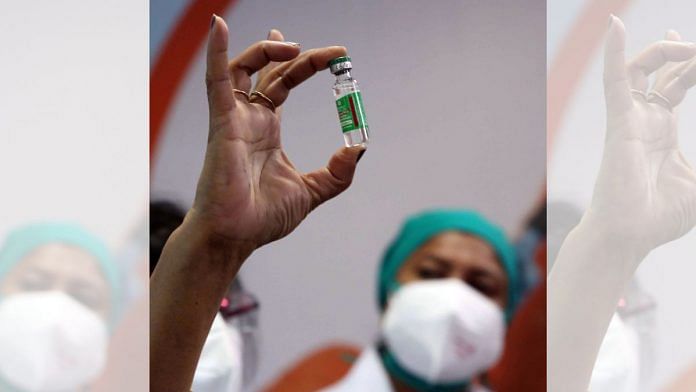New Delhi: A study published in The Lancet medical journal last week found that the Covid vaccine manufactured by AstraZeneca, marketed in India as Covishield, is “well tolerated and immunogenic in children aged 6-17 years”. It induced antibody concentrations “that are similar to those associated with high efficacy in phase 3 studies in adults”, reads the ‘Interpretation’ section of the study, adding that the trial raised no safety concerns.
The World Health Organization guidance document on the vaccine, updated Monday, continues to recommend that the vaccine be used only in adults. The WHO website says: “The vaccine is not recommended for persons younger than 18 years of age pending the results of further studies”.
The AstraZeneca vaccine, originally developed by the University of Oxford in the UK, is manufactured and marketed in India by the Pune-based Serum Institute of India as Covishield — the vaccine received by most Indians.
The Lancet study, conducted between 15 February and 2 April, 2021, is the first report of a paediatric clinical study of AstraZeneca’s ChAdOx1 nCoV-19 vaccine in 262 children aged between six and 17 years.
The study was funded by AstraZeneca and the UK Department of Health and Social Care through the UK National Institute for Health and Care Research.
“This is the first reported study of immunisation of children and adolescents with ChAdOx1 nCoV-19 at different intervals and shows that the vaccine is well tolerated and immunogenic in children and adolescents aged 6–17 years when given as a two-dose regimen. Reactogenicity was lower after the second dose than after the first dose regardless of dosing interval, a finding also observed in adult studies,” the researchers reported.
“Spike-specific cellular immune responses were observed following the first dose. The humoral immunity was greater in the 112-day dosing interval group than the 28-day interval group in participants aged 12–17 years, and greater in younger participants than older participants dosed 112 days apart,” they added.
Also read: Pfizer’s Covid vaccine safe & effective for children under 5, says US FDA
Some mild adverse events
The study reported that pain and tenderness at the injection site were the most common adverse events. Fatigue and headache were common, too, but were mostly resolved within 48 hours of vaccination.
“Nineteen (16 per cent) of 120 participants aged 12–17 years and 42 (47 per cent) of 90 participants aged 6–11 years reported fever (temperature ≥38°C) after receiving the first dose, reducing to 1 (1 per cent) of 113 in the older age group in both interval groups and 12 (15 per cent) of 80 in the younger age group after receipt of the second dose at 112 days,” it said.
“One participant aged 6–11 years receiving ChAdOx1 nCoV-19, reported a grade 4 fever of 40·2°C on day 1 following the first vaccination, which was resolved within 24 hours,” it added.
There were fewer adverse events after the second dose than after the first, according to the study.
Till 28 October, 2021, four adverse events of special interest (besides SARS-CoV-2 infection) were reported, with only one event — mild lymphadenopathy — considered probably related to the study vaccine (i.e. AstraZeneca’s ChAdOx1 nCoV-19). Four serious adverse events were reported with none deemed related to the study vaccine.
(Edited by Zinnia Ray Chaudhuri)
Also read: DCGI approval in, but here’s why you can’t choose Corbevax as your booster just yet



